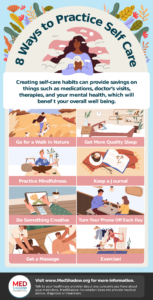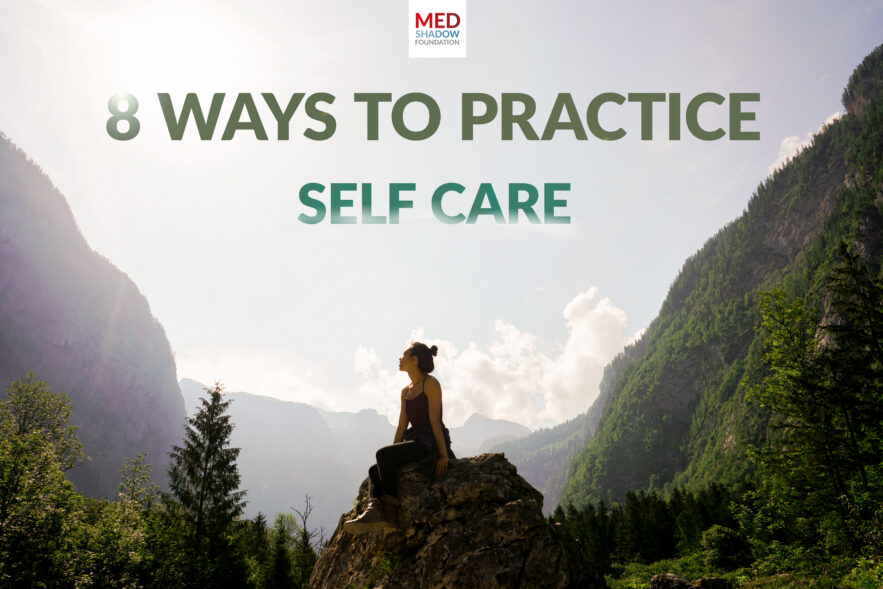While May is Mental Health Month, it is certainly not something you only want to address in one of 12 months a year! To balance your day-to-day stress, and find peace with your mental health each day, try doing more self-care.
If you are looking for ways to incorporate self-care into your daily or weekly routine, you may not have to look far. Self-care practices are all about doing what makes you feel good. No tricks, no gimmicks, and the only rule is: ask yourself what brings you joy.
Benefits of Self-Care

Self-care is thought to improve mood, increase resilience, help with stress management, and reduce risk of chronic illnesses. Self-care practices don’t have to cost a ton of money or time. You can start with taking opportunities to practice in or near your home or workspace. Sure, there are more costly options, but self-care doesn’t have to be difficult.
It is important to consider mental health the same way you would your physical health. According to the CDC, the two are equally as important. Depression, for example, can lead to a higher risk in diabetes, stroke, or heart disease.
Creating self-care habits could provide savings on things such as medications, doctor’s visits, therapies, and your mental health, which will help more than just your pocketbook. Better health could reduce the need for medications, which can come with unwanted side effects. Avoiding harmful medication side effects is much easier when you are simply on fewer medications in the first place.
Here are eight self-care ideas to get you started.
1. Exercise
According to the American Heart Association, 30 minutes of exercise per day, five days per week, can lower risk of heart disease, stroke, type 2 diabetes, high blood pressure, dementia, Alzheimer’s, several types of cancer, and some complications of pregnancy. It may also improve sleep, cognition, bone health, and balance.
Exercise shouldn’t be painful or unpleasant. Find activities you can do that don’t feel like exercise or hard work, but rather a fun outing. Exercises can include walking, hiking, biking, swimming, strength training, and any other movement that increases your heart rate.
2. Go for a Walk in Nature
Recent research has found that going on a nature walk can reduce symptoms of depression and anxiety, stress, and improve systolic and diastolic blood pressure. Indeed, nature walks allow you to slow down from your busy life to embrace everything around you, including the smell of fresh air and the blooming flowers in spring.
3. Get More Sleep
Quality sleep is vital to your health, as it can help boost your mood and creativity. The Centers for Disease Control and Prevention (CDC) recommends seven to nine hours a night of sleep for adults. The American Heart Association suggests setting an alarm an hour before bed, and then doing something relaxing (e.g. reading, journaling) to get to sleep faster each night. Avoid laying in bed at night on your phone or other electronics.
4. Practice Mindfulness
Mindfulness, rooted in Buddhist meditation, is a practice which involves paying attention to your thoughts, feelings, body, and the environment without judgment or categorizing them as positive or negative. Practicing mindfulness can help alleviate symptoms of depression, anxiety, and stress. Mindfulness may also be beneficial for pain management, weight control, and blood pressure management.
Mindfulness practices can be done anywhere, but many choose to practice somewhere quiet, with eyes open or closed. There are plenty of apps for phones and tablets to help you get started with this practice. You can even find guided meditations for free on YouTube. If you have trouble keeping your mind away from that running “to-do” list in your head, mindfulness can be a rewarding challenge. Start with five to ten minutes of mindfulness first to get a feel for the practice before trying longer intervals.
5. Keep a Journal
Journaling can be a good way to release some tension within the body. Letting thoughts go on to paper allows for a release from feelings that may hinder us from being the best version of ourselves. You can also use a journal to reflect on the positive things happening in your daily life.
Some products on today’s market offer prompts if you aren’t sure what to write about or fear writer’s block. Some journals also outline list formats that can help you cultivate gratitude or achieve other goals, such as “Name Three Good Things About Today” or “What Were Five Beautiful Things You’ve Seen This Week.” If you can’t find a book that fits your style, consider just searching online for a few concepts to write about to keep your journal flowing.
6. Turn Your Phone Off Each Day
Even just one hour a day of turning off your phone can be therapeutic for the mind. Allow yourself time to remember a time before cell phones, free from notifications from social media and other phone apps. If your life is full of responsibilities, and people who need to contact you, look for windows of time throughout your day when the phone doesn’t usually ring and then switch it off.
It can also be helpful to block such times off in your calendar. If you have a busy schedule, section off some times where you aim to have quiet, unplugged peace. It is self-care to schedule such necessary times to yourself. Experts have explained that less time on the phone, especially before bed, improves sleep, as well.
7. Do Something Creative
Try a paint and sip, or go to an arts festival. Creativity is a form of expression of the self. Maybe you bring a friend along and explore your creativity together. You can also check your local arts and crafts store for ideas. Maybe you can find a DIY project to start in the home. Adding creativity to your day can improve brain function, physical health, and mental health.
8. Get a Massage
There are different types of massages, many of which serve different purposes. A Swedish massage involves gentle touch, and can aid in relieving some muscle tension. A hot stone massage is similar to a Swedish massage, but with the addition of hot stones placed in different places of the body. Hot stone massages are believed to reduce pain, relieve stress, and improve blood flow. If your muscles constantly feel stiff or if you have other muscle problems, a deep tissue massage may help to relieve muscle stiffness, soreness and injury. Deep tissue massages may also help relieve chronic muscle pain.
Research has shown therapeutic massage can increase blood flow, reduce blood pressure and heart rate, and relieve pain. According to the American Massage Therapy Association, massage therapy can help manage stress, depressive symptoms, and pain. Massage therapy is also beneficial for those who have had joint replacements and are recovering from surgery. You don’t need an excuse for a massage, really. This is an excellent opportunity to tune out from the world and show yourself a little love.
Start Your Self-Care Journey Today!
Self-care should bring you peace and tranquility. Sometimes, we are doing things which bring us joy and don’t even realize it. Start with these activities first. Consider making a list of the things you enjoy doing when you do have time. If you have a free weekend, where do you like to spend it? If you didn’t have work today, what might you spend time doing?
Can you carve out more time for these activities throughout your day or week? If not, find other areas in your day where you can cut back. This will give you more balance between work and life. If you don’t already, consider keeping a calendar to show you where you are spending your time. Seeing the facts on paper (or a computer screen or phone) sometimes can bring immense clarity to your schedule. You may not realize how much time you spend doing activities (or how much free time you can squeeze in between them) until you map it out.
If you’re still not sure where to start at all, go for a walk to clear your mind. This could free your brain up with space to reflect on things you did during the day that brought you joy. Can you do these things 30 minutes a day? Or one hour a week?
Self-care will look different for everyone. It starts with recognizing where you find yourself the most calm and at peace and then committing to and putting more time into those areas.
References
American Heart Association. (n.d.). 3 tips for better sleep. https://www.heart.org/en/healthy-living/healthy-lifestyle/sleep/3-tips-for-better-sleep-infographic
American Heart Association. (2018, April 18). American Heart Association recommendations for physical activity in adults and kids. https://www.heart.org/en/healthy-living/fitness/fitness-basics/aha-recs-for-physical-activity-in-adults
American Massage Therapy Association. (n.d.) Massage therapy for mental health. https://www.amtamassage.org/resources/massage-and-health/mental-health/
Bliss, K. (2023, March 8). Hello sleep: the science and art of overcoming insomnia without medication, by Jade Wu, PhD, St. Martins Essentials. MedShadow. https://medshadow.org/hello-sleep-overcoming-insomnia/
Centers for Disease Control and Prevention. (2022, September 14). How much sleep do I need? https://www.cdc.gov/sleep/about_sleep/how_much_sleep.html
Gasibat, Q., & Suwehli, W. (2017). Determining the benefits of massage mechanisms: a review of literature. Rehabilitation Sciences, 3(2), 58-67.
Greater Good Magazine. (n.d.). Mindfulness defined. https://greatergood.berkeley.edu/topic/mindfulness/definition
Healthline. (n.d.). What are the different types of massage? https://www.healthline.com/health/types-of-massage
Jimenez, M. P., DeVille, N. V., Elliott, E. G., Schiff, J. E., Wilt, G. E., Hart, J. E., & James, P. (2021). Associations between nature exposure and health: A review of the evidence. International Journal of Environmental Research and Public Health, 18(9), 4790.
National Institute of Mental Health. (2022, December). Caring for your mental health. https://www.nimh.nih.gov/health/topics/caring-for-your-mental-health
Yasinski, E. (2022, September 23). Can forest bathing keep you healthy? MedShadow. https://medshadow.org/forest-bathing-relax/
(2020, September 3). The guide to strength training for beginners. MedShadow. https://medshadow.org/strength-training-for-beginners/
Zhang, D., Lee, E. K., Mak, E. C., Ho, C. Y., & Wong, S. Y. (2021). Mindfulness-based interventions: an overall review. British medical bulletin, 138(1), 41-57.






